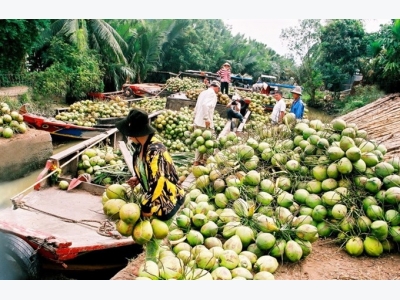Coconut farming languishing

Harvesting of coconuts in the Mekong province of Bến Tre. - VNS File Photo.
HCM CITY – Exports of coconut-based products are sluggish due to challenges and difficulties facing the coconut processing industry and coconut cultivation, according to the Bến Tre Province Agricultural Promotion Centre.
A study by the centre found that coconut farmers earn on average VNĐ60-70 million per hectare annually, but this could increase to VNĐ100-110 million if coconut is intercropped with cocoa, pomelo or shrimp farming.
The central province of Bình Định is the third largest coconut growing area in the country behind the Mekong provinces of Bến Tre and Trà Vinh.
Here, coconut farmers have benefitted from a steady rise in prices since 2015. Now dried coconuts sell for VNĐ9,000 – VNĐ10,000 each while fresh coconut milk is sold for VNĐ13,000 – VNĐ14,000 at groves.
Nguyễn An Điềm, a former chairman and CEO of the Bình Định-headquartered firm Pisico, said in Asian countries with developed coconut processing industries such as Sri Lanka and the Philippines, the trees offer high economic value because all segments of the industry, from farming to processing, have been modernised.
Điềm said coconut meat is exported from Việt Nam to European countries where it is processed into ice cream, milk and chocolate, the fibre is sold to Japan for making automobile seat cushions, and shell dippers can be used to make activated carbon, which fetches millions of đồng per kilogramme.
The timber is used for making handicraft products, he said.
Though coconut yields are high, the processing industry has not developed much, and thus Việt Nam exports raw materials, which do not fetch high prices.
Nguyễn Đăng Phú, deputy head of the Ministry of Industry and Trade-run Research Institute for Oil and Oil Plants, said one hectare in Việt Nam produces 9,863 coconuts or 1.9 tonnes of copra per year, the highest in Asia.
But its coconut export turnover is only worth a third to a fifth of other countries’, he said.
A coconut fetches VNĐ8,000, but products made from it are valued at up to VNĐ40,000, he said.
No investment has been made in building coconut processing plants to manufacture high-value products, he added.
More investment needed
To enhance the value of coconut-based products, authorities should have policies to mobilise investments in plants, Điềm said.
He said many enterprises want to invest in such plants, but hesitate because of the realisation they would face raw material shortages since coconut groves are small in size and scattered around the country. r oil to provide enough raw materials for processors.
They said more investment is required for research into coconut strains and processing and agricultural promotion activities.
The Government should provide financial support to farmers for acquiring new strains and technologies, they said.
Coconut co-operatives must be strengthened and alliances must be established in the farming and processing sectors, they said.
Brand names must be developed for Vietnamese coconut and promoted, they added
Có thể bạn quan tâm
 Solving trouble brewing in the Vietnam tea industry
Solving trouble brewing in the Vietnam tea industry The report found that the global tea market had grown at a CAGR of more than 5% during 2009-2016, reaching a production volume of roughly 5.6 million tons
 Vietnamese tea exporters enjoy robust achievements
Vietnamese tea exporters enjoy robust achievements Vietnam’s tea exports in the first eight months of the year reached 90,000 tonnes, earning US$142 million, up 12% in volume and 11.8% in value
 Thailand mangosteen, durian, longan re-exported to China through Vietnam
Thailand mangosteen, durian, longan re-exported to China through Vietnam According to the Vietnam Customs, three above fruits are main goods exported to China and originated from Thailand.